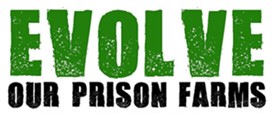Media Release
May 6, 2017
A NEW VOICE ON PRISON FARMS EMERGES
KINGSTON, ONTARIO. Evolve Our Prison Farms (EOPF) is a community coalition with an exciting and forward-looking proposal for the re-instatement of prison farms, and its vision is garnering wide support.
EOPF has submitted to Ralph Goodale, Mark Gerretsen, and other legislators a model for plant-based prison farming that prioritizes ecological stewardship, meaningful rehabilitation and employment programming for prisoners, and community development and food security. Evolved farms would focus on production of nutrient dense vegetables, legumes, fruits, grains, nuts and seeds, using approaches that are ecologically sustainable, technologically sophisticated, and consistent with changing community values around healthy lifestyles, food security, and respect for animals and the environment. Evolved farms could be established at a fraction of the cost of re-instating animal agriculture on prison farms.
EOPF recognizes a place for animals on evolved farms – but in much smaller numbers, and engaged in activities which don’t involve commodification and violence. For example, animals could provide fertilizer, pollination services, or participate in non-exploitative roles. The remaining members of the former Kingston Pen Herd could be returned to the prison farms under a model of sanctuary, offering the opportunity for prisoners to care for animals, and to work alongside them, without harming them.
“Canadians want prison programs that offer meaningful opportunities for psychological healing and growth, and a path to reintegration,” notes EOPF member Sue Donaldson. “Forcibly inseminating cows, separating them from their calves, and slaughtering male calves, ‘spent’ dairy cows and chickens, are activities which have no place in prison farm programs. With everything we know about the psychological damage suffered by slaughterhouse workers, and the connections between slaughterhouse work and domestic violence, it would quite simply be irresponsible to consider re-instating dairy and egg farms at prisons. Stewardship of plants, the environment, and genuine care for animals through a sanctuary model, on the other hand, offer genuine therapeutic benefits.”
A recent petition garnered thousands of supporters for this vision of humane and sustainable prison farms.
“I find this proposal exceptionally sensible and heartening,” writes signatory Toni Pickard of Kingston. “My concern is more on providing helpful skills, both functional and attitudinal for the prisoners than on saving the animals but the two are very persuasively allied in this plan. If this plan were adopted for prison farms, we will have taken giant steps forward in rehabilitation techniques, while providing prisoners an experience of what it takes to begin to create a healthier, sustainable, compassionate world.”
Farming practices need to evolve to feed a growing population in a world of finite land, water and other resources. Compared to animal agriculture, plant-based farming involves much lower energy and water use, greenhouse gas emissions, and pollution. If Correctional Service Canada decides to re-establish prison farms, it makes sense to anticipate where farming (and farm jobs) are headed, rather than to chase a disappearing past.
– 30 –
